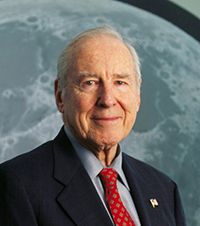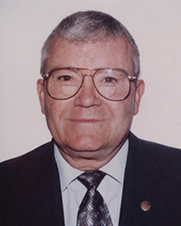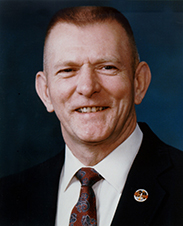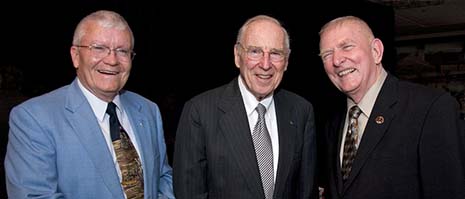Apollo 13 Astronauts and Flight Director to Speak at U of A
FAYETTEVILLE, Ark. – Two of the Apollo 13 astronauts and the Mission Control flight director who helped return them safely to Earth will speak about the ill-fated moon mission at 7 p.m. Thursday, April 23, in Bud Walton Arena.
The event is sponsored by the student Distinguished Lecture Series. It is free and open to the public. No tickets are required.
James Lovell and Fred Haise were captain and lunar module pilot of Apollo 13 when it was launched on April 11, 1970. This was intended to be the third NASA mission to land men on the moon. Two days into the flight, during a routine maneuver, an oxygen tank on the service module exploded, crippling the spacecraft. Apollo 13 and its three-man crew were some 200,000 miles from Earth.
Gene Krantz, back at Mission Control in Houston, worked with the crew and a team of NASA engineers and astronauts to solve a series of critical problems on the craft, including limited power, loss of cabin heat, shortage of clean water, and the need to repair the carbon dioxide removal system. Their desperate efforts were successful: Apollo 13 and crew returned safely to Earth on April 17.
A generation around the world watched the drama unfold on their televisions in 1970.
Another generation learned the story in the Ron Howard film Apollo 13, released in 1995. In the film Lovell was portrayed by Tom Hanks, Haise by Bill Paxton, and Kranz by Ed Harris. The film earned a Best Picture Oscar, and Harris won Best Supporting Actor. Apollo 13 remains popular on home video.
Lovell, Haise and Kranz will recount their experiences, explore the lessons of Apollo 13 and discuss the future of NASA and the U.S. space program during their visit to the University of Arkansas.
James Lovell
 |
| James Lovell |
James Lovell was born in Cleveland, Ohio, on March 25, 1928, and is a graduate of the U.S. Naval Academy, the University of Southern California’s Aviation Safety School, and the Harvard Business School’s Advanced Management Program. He was a Navy jet pilot before being selected to be a NASA astronaut in 1962.
He made four space flights with NASA: Gemini 6, Gemini 7, Gemini 12, Apollo 8 and Apollo 13, logging 713 flight hours in space.
He retired from the Navy and NASA in 1973. In civilian life he was president of Bay-Houston Towing, Fisk Telephone Systems and executive vice president of the Centel Corp.
In 1994, Lovell and Jeff Kluger wrote Lost Moon, the story of Apollo 13 mission. The following year the film version of the book, Apollo 13 was released. Lovell has also appeared in several segments of Tom Hanks’ From the Earth to the Moon, the HBO documentary miniseries that aired in the spring of 1998.
Today, he is president of Lovell Communications, a business devoted to disseminating information about the U.S. space program.
Lovell has earned numerous honors including the Presidential Medal of Freedom, two Navy Distinguished Flying Crosses, NASA Distinguished and Exceptional Service Medals and the Congressional Space Medal of Honor.
FRED HAISE
 |
| Fred Haise |
Fred Haise was born November 14, 1933, in Biloxi, Mississippi. He graduated with honors in aeronautical engineering from the University of Oklahoma in 1959 and served as a U.S. Marine Corps fighter pilot, later flying with the Ohio Air National Guard.
Haise began his 20-year NASA career in 1966, serving on the backup crew for the Apollo 8 and 11 missions before being chosen as lunar module pilot for Apollo 13.
The Apollo 13 mission was not Haise’s only close brush with death. In 1973 he was involved in a crash while flying a plane during the filming of the movie Tora! Tora! Tora and was burned over 65 percent of his body. He went through 14 months of recovery and rehabilitation before he was able to fly again, but in 1977 he was chosen to fly five test missions as commander of the Space Shuttle Enterprise.
After leaving NASA Haise served as president of Northrop Grumman Technical Services, a wholly owned subsidiary company of The Northrop Grumman Corp.
His honors include the Presidential Medal of Freedom, the NASA Distinguished Service Medal, the NASA Exceptional Service and Special Achievement Awards, and induction into the Astronaut Hall of Fame.
GENE KRANZ
 |
| Gene Kranz |
Gene Kranz was born on August 17, 1933, in Toledo, Ohio, and received his B.S. degree in aeronautical engineering from Parks College of Saint Louis University in 1954. He was commissioned in the U.S. Air Force in 1954, and flew high-performance jet fighters.
Kranz joined NASA in 1960 as assistant flight director for Project Mercury. He assumed flight director duties for all Project Gemini missions and continued his duties as flight director for the Apollo program, including the Apollo 11 lunar landing.
During the Apollo 13 crisis Kranz led the "Tiger Team" that successfully guided the crippled spacecraft back to Earth.
Kranz has described working on the American space program as an ultimate frontier experience: "We were working at the ragged edge of all knowledge, all technology and all experience."
Kranz retired from NASA in March 1994. He wrote Failure Is Not An Option (2000), which chronicled his NASA career. The best-seller was the basis for the History Channel documentary Mission Control.
Kranz has been awarded the Presidential Medal of Freedom, NASA’s Ambassador of Exploration Award, NASA’s Distinguished Service and Outstanding Leadership Medals and was inducted into the International Space Hall of Fame.
About Distinguished Lecture Series: The Distinguished Lecture Series is a student-sponsored program. Speakers are chosen by a committee of students, faculty and staff, and the events are funded by a student-approved fee, appropriated by the Programs Allocation Board.
About the University of Arkansas: The University of Arkansas provides an internationally competitive education for undergraduate and graduate students in more than 200 academic programs. The university contributes new knowledge, economic development, basic and applied research, and creative activity while also providing service to academic and professional disciplines. The Carnegie Foundation classifies the University of Arkansas among only 2 percent of universities in America that have the highest level of research activity. U.S. News & World Report ranks the University of Arkansas among its top American public research universities. Founded in 1871, the University of Arkansas comprises 10 colleges and schools and maintains a low student-to-faculty ratio that promotes personal attention and close mentoring.
Contacts
Steve Voorhies, manager, media relations
University Relations
479-575-3583, voorhies@uark.edu
